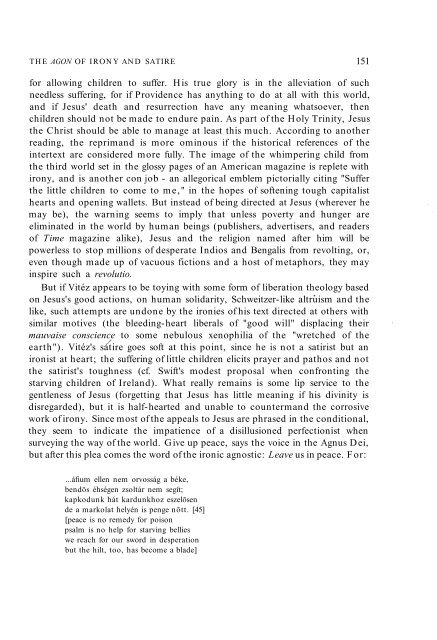HUNGARIAN STUDIES 11. No. 1. Nemzetközi Magyar ... - EPA
HUNGARIAN STUDIES 11. No. 1. Nemzetközi Magyar ... - EPA
HUNGARIAN STUDIES 11. No. 1. Nemzetközi Magyar ... - EPA
- No tags were found...
You also want an ePaper? Increase the reach of your titles
YUMPU automatically turns print PDFs into web optimized ePapers that Google loves.
THE AGON OF IRONY AND SATIRE 151for allowing children to suffer. His true glory is in the alleviation of suchneedless suffering, for if Providence has anything to do at all with this world,and if Jesus' death and resurrection have any meaning whatsoever, thenchildren should not be made to endure pain. As part of the Holy Trinity, Jesusthe Christ should be able to manage at least this much. According to anotherreading, the reprimand is more ominous if the historical references of theintertext are considered more fully. The image of the whimpering child fromthe third world set in the glossy pages of an American magazine is replete withirony, and is another con job - an allegorical emblem pictorially citing "Sufferthe little children to come to me," in the hopes of softening tough capitalisthearts and opening wallets. But instead of being directed at Jesus (wherever hemay be), the warning seems to imply that unless poverty and hunger areeliminated in the world by human beings (publishers, advertisers, and readersof Time magazine alike), Jesus and the religion named after him will bepowerless to stop millions of desperate Indios and Bengalis from revolting, or,even though made up of vacuous fictions and a host of metaphors, they mayinspire such a revolutio.But if Vitéz appears to be toying with some form of liberation theology basedon Jesus's good actions, on human solidarity, Schweitzer-like altruism and thelike, such attempts are undone by the ironies of his text directed at others withsimilar motives (the bleeding-heart liberals of "good will" displacing theirmauvaise conscience to some nebulous xenophilia of the "wretched of theearth"). Vitéz's satire goes soft at this point, since he is not a satirist but anironist at heart; the suffering of little children elicits prayer and pathos and notthe satirist's toughness (cf. Swift's modest proposal when confronting thestarving children of Ireland). What really remains is some lip service to thegentleness of Jesus (forgetting that Jesus has little meaning if his divinity isdisregarded), but it is half-hearted and unable to countermand the corrosivework of irony. Since most of the appeals to Jesus are phrased in the conditional,they seem to indicate the impatience of a disillusioned perfectionist whensurveying the way of the world. Give up peace, says the voice in the Agnus Dei,but after this plea comes the word of the ironic agnostic: Leave us in peace. For:...áfium ellen nem orvosság a béke,bendős éhségen zsoltár nem segít;kapkodunk hát kardunkhoz eszelősende a markolat helyén is penge nőtt. [45][peace is no remedy for poisonpsalm is no help for starving bellieswe reach for our sword in desperationbut the hilt, too, has become a blade]
















